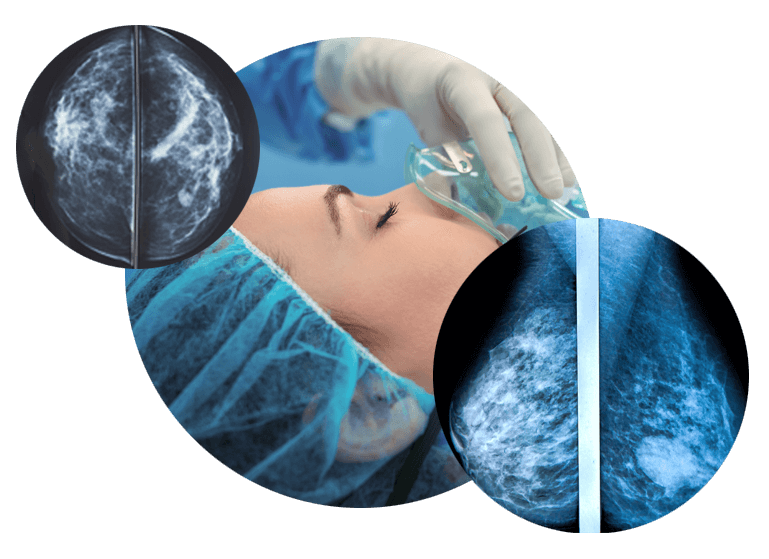Breast Cancer (The Basics)
Is there a test for breast cancer?
Mammogram is the most common used test to check for breast cancer in patient over 40. Other tests including ultrasound or MRI is also available if indicated. If a Xray finds a spot that is unusual, it will often be needing a tissue diagnosis, and a biopsy will be performed. During a biopsy, a doctor takes 1 or more small samples of tissue from the breast. That way the doctor can look at the cells under a microscope to see if they have cancer.
At this point in time, blood test is generally not specific enough for breast cancer, but it can be useful for breast cancer follow-up. genetic testing for DNA mutation can be done in selected setting. Please check with your specialist.
What is breast cancer staging?
Cancer staging is a way in which doctors find out how far a cancer has spread. This will help to decide what would be the right treatment for you.
Grading of cancer is different to staging. This means usually indicate the potential aggressiveness of the cancer.
How is breast cancer treated?
The following treatments are available and will be recommended for you by your specialist depends on what you need.
- Surgery – Surgery to remove the cancer. Most women with breast cancer can have the option of either mastectomy and breast conserving therapy or lumpectomy depending on your cancer.
– Mastectomy is surgery to remove the whole breast. Depending on the cancer, reconstruction of the breast can be discussed
– Breast conserving therapy / lumpectomy is surgery to remove the cancer with a section of healthy tissue around it. This option must have radiation therapy after surgery to achieved optimal cure rate, similar to having mastectomy.
- Radiation therapy – Radiation kills cancer cells. this usually takes a course either 3-5 weeks, which is daily from Monday to Friday. You will be referred to a Radiation Oncologist either in the public or private hospital depending on where you live and your insurance cover.
- Chemotherapy – Chemotherapy is a toxic medicine that designed to kill cancer cells.
- Hormone therapy – Some forms of breast cancer grow in response to hormones. Your doctor might give you treatments to block hormones or to prevent your body from making certain kinds of hormones.
- Targeted therapy – Some medicines work only on cancers that have certain characteristics. Your doctor might test you to see if you have a kind of cancer that would respond to this kind of therapy.
+/- reconstruction with own tissue or implant. Usually done by breast reconstructive plastic surgeon.
What happens after treatment?
After treatment, you will need to be checked regularly to see if the cancer comes back. You should watch for symptoms that could mean the cancer has come back. Examples of these symptoms include new lumps in the breast area, pain (in the bones, chest, or stomach), trouble breathing, and headaches. If you start having any new symptom, mention it to your doctor.
Mammogram and Ultrasound, in some cases contrast enhanced mammogram are done on the yearly basis. CT scan, bone scan or PET scan are needed only in selected circumstances. Blood test are usually done when you see your medical oncologists, especially with advanced stage of cancer.
What happens if cancer comes back or spreads?
That depends on where the cancer is. You will need further imaging and biopsy. Most people get hormone therapy or chemotherapy. Some people also have surgery to remove new tumours.
We usually have a team of specialists to discuss the cases at our multidisciplinary meeting to recommend the best way forward.
Can breast cancer be prevented?
Women who are at high risk of getting breast cancer can sometimes take a preventive medicine to help reduce the risk of the disease. If you have a strong family history of breast cancer, ask your doctor what you can do to prevent cancer.
In cases where genetic mutation are detected, there may be an option to perform rick reduction surgery +/- reconstruction.
What will my life be like?
Many people with breast cancer do very well after treatment. The important thing is to take your medicines as directed and to follow all your doctors’ instructions about visits and tests. It’s also important to talk to your doctor about any side effects or problems you have during treatment.
Getting treated for breast cancer involves making many choices. Besides choosing which surgery to have, you might have to choose which medicines to take and when.
Always let your doctors and nurses know how you feel about a treatment. Any time you are offered a treatment, ask:
- What are the benefits of this treatment?
- Is it likely to help me live longer?
- Will it reduce or prevent symptoms?
- What are the downsides to this treatment?
- Are there alternatives to this treatment?
- What happens if I do not have this treatment?

